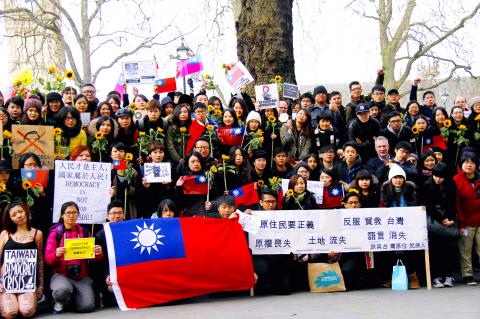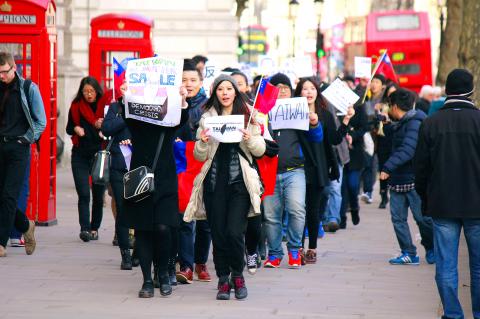Taiwanese students and expatriates gathered in central London on Sunday afternoon to show their support for the occupation of the Legislative Yuan and democracy back home.
More than 200 people marched from London’s Piccadilly Circus to the Houses of Parliament, passing the British prime minister’s official residence at 10 Downing Street on the way. Many carried Republic of China (ROC) flags, while others displayed sunflowers or placards criticizing the cross-strait service trade pact.
Meanwhile, in the US, about 100 Taiwanese-Americans gathered on the National Mall in Washington over the weekend, waving placards and chanting in support of the student action in Taipei.

Photo: Courtesy of Chen Szu-wei
In front of London’s iconic Big Ben and the Houses of Parliament at Parliament Square, speakers voiced their support for the “Sunflower Revolution” and the crowd sang Do You Hear the People Sing? from the musical Les Miserables, an unofficial anthem of various recent protests in Taiwan.
Events at the Legislative Yuan galvanized Chen Szu-wei (陳思維) to use social media to organize Sunday’s march in London.
“Due to the Taiwanese government’s stubborn attitude on the cross-strait agreement with China, which is a far-reaching agreement that has not been carefully reviewed and has not been subject to transparent review, we decided to rally together and stand up to fight against the decision of the Taiwanese government and protect the democracy of our country,” he said.

Photo: Courtesy of Chen Szu-wei
Chen, 30, works in London and was keen to show solidarity with protesters.
“We can’t fly back to support them, but we can show our determination to preserve democracy,” the Greater Taichung native said.
Ukrainian tourist Viktor Kripak saw the protest and felt obliged to address the crowd in light of recent events in his homeland.
“I think it’s very important to show people in London that in Taiwan there is such a situation,” Kripak said.
A 27-year-old from Hong Kong — who gave only the name Chas — was also sympathetic.
“Recently the government in China has been curtailing freedom of speech [in Hong Kong], so that’s why I can understand how bad [the Taiwanese protesters] feel. I guess it’s good to come out and give support to them,” Chas said.
A Chinese student also declared his encouragement, expressing his wish that one day young people in China would have their voices heard.
Anna Peng from Taipei, who is studying for a master’s degree in psychology in London, also addressed the crowd.
“I felt the need to come out to kind of stand up for my country and express my opinions to the [ROC] government that we are not comfortable with the way the government is dealing with China at the moment,” she said.
Long-time London resident Liu Yu-chuan (劉鈺娟) said that Taiwanese of all political persuasions should be concerned about the way the service trade agreement has been handled.
“It’s a simple request for transparency,” she said. “The service agreement impacts on immigration and Taiwan’s tax, health and benefit systems, and hence deserves a public hearing and thorough scrutiny.”
Londoner George Mills, who is married to a Taiwanese, was worried about the potential effects of the cross-strait pact and wanted to attend Sunday’s event to give his backing to the struggle for freedom.
“A lot of people in Taiwan know what it’s like to live in a dictatorship, and it’s a young democracy that they have, and I’m here to support that,” Mills said.
Additional reporting by William Lowther

CHAOS: Iranians took to the streets playing celebratory music after reports of Khamenei’s death on Saturday, while mourners also gathered in Tehran yesterday Iranian Supreme Leader Ayatollah Ali Khamenei was killed in a major attack on Iran launched by Israel and the US, throwing the future of the Islamic republic into doubt and raising the risk of regional instability. Iranian state television and the state-run IRNA news agency announced the 86-year-old’s death early yesterday. US President Donald Trump said it gave Iranians their “greatest chance” to “take back” their country. The announcements came after a joint US and Israeli aerial bombardment that targeted Iranian military and governmental sites. Trump said the “heavy and pinpoint bombing” would continue through the week or as long

TRUST: The KMT said it respected the US’ timing and considerations, and hoped it would continue to honor its commitments to helping Taiwan bolster its defenses and deterrence US President Donald Trump is delaying a multibillion-dollar arms sale to Taiwan to ensure his visit to Beijing is successful, a New York Times report said. The weapons sales package has stalled in the US Department of State, the report said, citing US officials it did not identify. The White House has told agencies not to push forward ahead of Trump’s meeting with Chinese President Xi Jinping (習近平), it said. The two last month held a phone call to discuss trade and geopolitical flashpoints ahead of the summit. Xi raised the Taiwan issue and urged the US to handle arms sales to

BIG SPENDERS: Foreign investors bought the most Taiwan equities since 2005, signaling confidence that an AI boom would continue to benefit chipmakers Taiwan Semiconductor Manufacturing Co’s (TSMC, 台積電) market capitalization swelled to US$2 trillion for the first time following a 4.25 percent rally in its American depositary receipts (ADR) overnight, putting the world’s biggest contract chipmaker sixth on the list of the world’s biggest companies by market capitalization, just behind Amazon.com Inc. The site CompaniesMarketcap.com ranked TSMC ahead of Saudi Aramco and Meta Platforms Inc. The Taiwanese company’s ADRs on Tuesday surged to US$385.75 on the New York Stock Exchange, as strong demand for artificial intelligence (AI) applications led to chip supply constraints and boost revenue growth to record-breaking levels. Each TSMC ADR represents

State-run CPC Corp, Taiwan (CPC, 台灣中油) yesterday said that it had confirmed on Saturday night with its liquefied natural gas (LNG) and crude oil suppliers that shipments are proceeding as scheduled and that domestic supplies remain unaffected. The CPC yesterday announced the gasoline and diesel prices will rise by NT$0.2 and NT$0.4 per liter, respectively, starting Monday, citing Middle East tensions and blizzards in the eastern United States. CPC also iterated it has been reducing the proportion of crude oil imports from the Middle East and diversifying its supply sources in the past few years in response to geopolitical risks, expanding